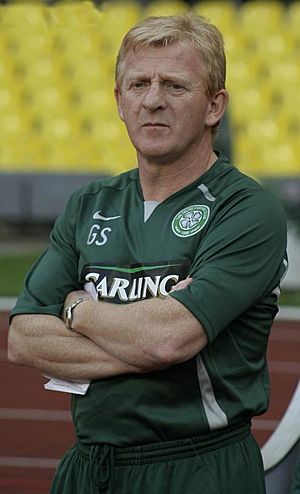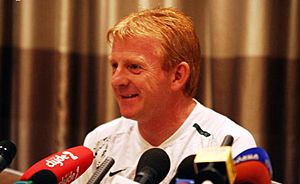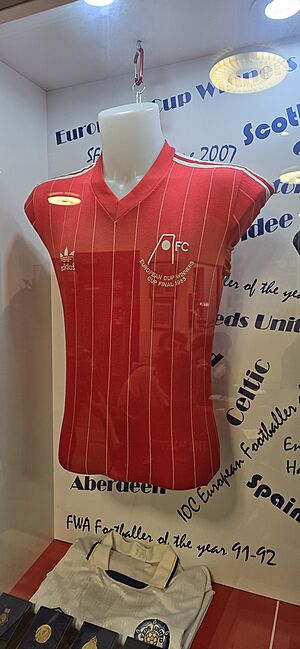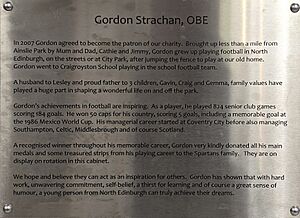Gordon Strachan facts for kids

Strachan as manager of Celtic in 2007
|
|||
| Personal information | |||
|---|---|---|---|
| Full name | Gordon David Strachan | ||
| Date of birth | 9 February 1957 | ||
| Place of birth | Edinburgh, Scotland | ||
| Height | 5 ft 6 in (1.68 m) | ||
| Position(s) | Midfielder | ||
| Team information | |||
|
Current team
|
Dundee (technical director) | ||
| Youth career | |||
| 1971–1974 | Dundee | ||
| Senior career* | |||
| Years | Team | Apps | (Gls) |
| 1974–1977 | Dundee | 69 | (13) |
| 1977–1984 | Aberdeen | 183 | (55) |
| 1984–1989 | Manchester United | 160 | (33) |
| 1989–1995 | Leeds United | 197 | (37) |
| 1995–1997 | Coventry City | 26 | (0) |
| Total | 635 | (138) | |
| International career | |||
| 1979 | Scotland U21 | 1 | (0) |
| 1980–1992 | Scotland | 50 | (5) |
| Managerial career | |||
| 1996–2001 | Coventry City | ||
| 2001–2004 | Southampton | ||
| 2005–2009 | Celtic | ||
| 2009–2010 | Middlesbrough | ||
| 2013–2017 | Scotland | ||
| *Club domestic league appearances and goals | |||
Gordon David Strachan was born on February 9, 1957. He is a Scottish former football coach and player. Currently, he works as the Technical Director for Dundee.
Strachan played for several famous clubs. These included Dundee, Aberdeen, Manchester United, Leeds United, and Coventry City. He also played for the Scotland national team.
After his playing career, he became a manager. He managed Coventry City, Southampton, Celtic, Middlesbrough, and the Scotland national team.
As a player, Strachan played in 635 league games. He scored 138 goals in total. He spent 21 of his 25 seasons playing in the top football leagues in England or Scotland. For Scotland, he played 50 times and scored five goals. He also played in two FIFA World Cup tournaments: Spain 1982 and Mexico 1986.
Strachan stopped playing football in 1997 when he was 40 years old. At that time, he set a Premier League record for the oldest outfield player. He was a right-sided midfielder.
He won many trophies with Aberdeen in the early 1980s. These included league titles and cup wins. He also won the 1982–83 European Cup Winners' Cup and the 1983 European Super Cup. With Manchester United, he won the 1985 FA Cup final. As captain of Leeds, he won the Second Division in 1989–90 and the First Division in 1991–92.
After becoming a full-time manager, he led Southampton to the 2003 FA Cup final. He then managed Celtic, winning three league titles in a row. He was named FWA Footballer of the Year in 1990–91. He also won Manager of the Year awards in Scotland multiple times. In 2007, Strachan was added to the Scottish Football Hall of Fame. He was also awarded an Officer of the Order of the British Empire (OBE) in 1993 for his contributions to football.
Contents
Playing Career Highlights
Gordon Strachan grew up in Muirhouse, Edinburgh. He supported Hibernian as a child. When he was 15, he had an accident playing football. A pen in his pocket injured his right eye, almost causing him to lose his sight.
Starting at Dundee
Strachan began his football journey with Dundee at age 14. He chose Dundee over Manchester United. He felt he had a better chance to play in the first team at Dens Park. He quickly became known as a talented player. He won the Scottish Reserve Player of the Year Award twice.
He became a regular player in the 1975–76 season. This was the first season of the Scottish Premier Division. Dundee was relegated on the last day of that season.
For the 1976–77 season, 19-year-old Strachan became Dundee's captain. He is still the youngest player to have captained the club. He later felt he was not a good captain at that time. He left Dundee in October 1977.
Success with Aberdeen
In November 1977, Aberdeen signed Strachan for £50,000. His first season, 1977–78, was difficult due to injuries. Aberdeen finished second in the league.
Alex Ferguson became Aberdeen's new manager in 1978. Strachan played in the League Cup final against Rangers. Aberdeen won the league title in 1979–80. They closed a ten-point gap on Celtic to win. Strachan was named SFWA Footballer of the Year at the end of the season.
In 1981–82, Aberdeen finished second to Celtic. However, they won the Scottish Cup. They beat Rangers 4–1 in extra time. Strachan scored one goal and assisted another.
The 1982–83 season was the best in the club's history. Aberdeen won the Scottish Cup and the European Cup Winners' Cup. They beat Spanish giants Real Madrid 2–1 in extra time in the European final. They also won the Scottish Cup by beating Rangers 1–0.
In 1983–84, Aberdeen won the league title and the Scottish Cup again. Strachan set up the winning goal in the cup final against Celtic. They also won the 1983 European Super Cup by defeating Hamburger SV.
Time at Manchester United
In August 1984, Manchester United bought Strachan for £500,000. He scored four goals in his first seven matches. United finished fourth in the league in 1984–85. He played in the 1985 FA Cup Final at Wembley. United won 1–0 against Everton.
In 1985–86, Strachan was injured for much of the season. United struggled with injuries to key players. Alex Ferguson became manager in November 1986. United finished 11th in 1986–87 and second in 1987–88.
Captain of Leeds United
In March 1989, Strachan joined Leeds United for £200,000. He quickly became a fan favorite at Elland Road. He was given the captain's armband. He helped the club win the Second Division title in 1989–90.
Leeds was now in the First Division. Strachan, Gary McAllister, David Batty, and Gary Speed formed a strong midfield. They finished fourth in 1990–91. Strachan was voted FWA Footballer of the Year for his great performances. He was the first player to win this award in both Scotland and England.
Strachan signed a new contract and led Leeds to win the league title in 1991–92. He was awarded an OBE for his services to sport.
Leeds finished 17th in the new Premier League in 1992–93. Strachan still played well and won the club's Player of the Year award. He scored a hat-trick against Blackburn Rovers in April 1993. He played less in 1994–95, which was his last season at Leeds.
Player-Coach at Coventry City
In March 1995, Strachan moved to Coventry City. He became assistant manager under Ron Atkinson. It was planned that he would become manager in 1997. Strachan coached the team and also played 26 Premier League matches. He finally stopped playing at age 40. In November 1996, Strachan was appointed manager of Coventry City.
International Career
Strachan played his first game for Scotland on May 16, 1980. This was against Northern Ireland. He helped Scotland qualify for the 1982 FIFA World Cup. He scored an important goal against Sweden in qualifying.
At the World Cup in Spain, Scotland beat New Zealand 5–2. Strachan was named Man of the Match. Scotland then lost 4–1 to Brazil. A 2–2 draw with the Soviet Union meant Scotland left the tournament.
Scotland also qualified for the 1986 FIFA World Cup. Manager Jock Stein passed away, and Alex Ferguson took over. Scotland had to beat Australia in a play-off. Strachan played in the first game.
In Mexico, Scotland lost 1–0 to Denmark. Strachan then scored in a 2–1 loss to West Germany. His goal celebration was famous because he tried to climb the advertising boards but was too short. Scotland drew 0–0 with Uruguay in their final group match.
Strachan played less for the national team under Andy Roxburgh. He was not in the squad for the 1990 FIFA World Cup. However, he played for Scotland again between 1990 and 1992. He captained his country during qualification for UEFA Euro 1992. He retired from international football due to back problems and did not go to Sweden for the tournament. He played 50 times for Scotland and scored five goals.
Managerial Career
Coventry City Manager
Strachan became player-manager of Coventry City in November 1996. He appointed Alex Miller as his assistant. Results improved, and Strachan was named Manager of the Month in December. However, a poor run of results later put the "Sky Blues" in the relegation zone. Late wins against Liverpool, Chelsea, and Tottenham Hotspur saved them from relegation. Strachan played in the win over Chelsea at age 40, a record for an outfield player in the Premier League at the time.
Coventry finished 11th in 1997–98. Strachan signed international players like Magnus Hedman, Roland Nilsson, George Boateng, and Viorel Moldovan. He was again named Manager of the Month in February 1998.
The club finished 15th in 1998–99 and 14th in 1999–2000. Coventry was relegated at the end of the 2000–01 season. This made Strachan unpopular with fans. He was sacked five matches into the 2001–02 season.
Southampton Manager
Strachan quickly returned to management. He took over Southampton in October 2001. Many thought Southampton would be relegated, but Strachan improved their performance. They finished 11th in the Premier League.
In 2002–03, Southampton finished eighth. They also reached the 2003 FA Cup Final, but lost 1–0 to Arsenal. Because Arsenal had qualified for the Champions League, Southampton earned a spot in the UEFA Cup.
Strachan resigned as Southampton manager in February 2004. He wanted to take a break from football.
Celtic Manager

After a 16-month break, Strachan became manager of Celtic on June 1, 2005. His goal for 2005–06 was to win the Scottish Premier League (SPL) title. His start was difficult, with a 5–0 loss to Artmedia Bratislava. However, Celtic improved under Strachan.
His first season was successful. He led Celtic to win the League Cup. On April 5, 2006, his team won the SPL title early. Strachan was voted Manager of the Year by Scottish football writers.
In the next year, Strachan brought in new players. Celtic did very well and had a large lead in the SPL. They also reached the knockout stages of the UEFA Champions League for the first time since 1993. They lost to Milan in extra time. On April 22, 2007, Strachan guided Celtic to their 41st league championship. This was their second title in a row. He was also named the first PFA Scotland Manager of the Year. Celtic also won the 2006–07 Scottish Cup.
In the 2007–08 season, Celtic reached the Champions League round of 16 again. Despite some criticism, Strachan led Celtic to three consecutive Scottish league titles on May 22, 2008. He was only the third Celtic manager to do this.
In the 2008–09 season, Celtic won the League Cup. However, they did not win the league title. Strachan resigned as manager on May 25, 2009.
Middlesbrough Manager
Strachan signed a four-year contract with Middlesbrough on October 26, 2009. His first match was a 1–0 loss. Middlesbrough won their first game under Strachan on December 5, 2009.
After a poor start to the 2010–11 season, Strachan left the club by agreement on October 18, 2010.
Scotland National Team Manager
Strachan was appointed manager of the Scotland national team on January 15, 2013. His first match was a 1–0 win against Estonia. Scotland lost their first two competitive matches, ending their chances for the 2014 World Cup. However, Scotland's form improved, winning against Croatia and Macedonia.
In Euro 2016 qualifying, Scotland was in a tough group. They had wins against Georgia, Ireland, and Gibraltar. They also drew away against Poland and Ireland. However, a loss to Georgia and a home defeat by Germany made qualification difficult. A late goal by Poland in their match eliminated Scotland. Strachan resigned on October 12, 2017, after failing to qualify for the 2018 FIFA World Cup.
Management Style
Strachan often used a traditional 4–4–2 formation. He is known for his strict management style. He watches video replays of matches many times. He also focuses a lot on player health and fitness. He often gave players advice on their diet. He believed his own long playing career was due to a healthy diet. Players like Gary Caldwell said their success at Celtic was because of Strachan's lifestyle changes.
Strachan is also known for his dry sense of humor in interviews.
Other Work
Strachan has worked as a football analyst for the media. He has appeared on BBC Sport's Match of the Day 2. He also worked as a pundit for ITV's coverage of the FA Cup and the UEFA Champions League. He was a pundit for ITV during the 2014 World Cup.
For the 2006 World Cup, Strachan was an official FIFA Ambassador for Scotland. He helped raise money for SOS Children's Villages.
In August 2009, Strachan and his two sons started their own football school in the Coventry area. In July 2019, Strachan became the technical director for Dundee.
Personal Life
Gordon Strachan married Lesley Scott in 1977. They have three children: Craig and Gavin Strachan, who are also footballers, and Gemma Strachan. Strachan's grandson, Luke, is also a footballer. He came through the youth system at Dundee while Gordon was technical director there.
Career statistics
Club
| Club | Season | League | National cup | League cup | Continental | Other | Total | |||||||
|---|---|---|---|---|---|---|---|---|---|---|---|---|---|---|
| Division | Apps | Goals | Apps | Goals | Apps | Goals | Apps | Goals | Apps | Goals | Apps | Goals | ||
| Dundee | 1973–74 | Scottish First Division | 0 | 0 | 0 | 0 | 1 | 0 | 0 | 0 | – | 1 | 0 | |
| 1974–75 | 1 | 0 | 0 | 0 | 1 | 0 | 0 | 0 | – | 2 | 0 | |||
| 1975–76 | Scottish Premier Division | 23 | 6 | 1 | 0 | 6 | 0 | 0 | 0 | – | 30 | 6 | ||
| 1976–77 | Scottish First Division | 36 | 7 | 6 | 1 | 0 | 0 | – | – | 42 | 8 | |||
| 1977–78 | 9 | 0 | 0 | 0 | 5 | 1 | – | – | 14 | 1 | ||||
| Total | 69 | 13 | 7 | 1 | 13 | 1 | 0 | 0 | – | 89 | 15 | |||
| Aberdeen | 1977–78 | Scottish Premier Division | 12 | 1 | 4 | 0 | 0 | 0 | 0 | 0 | – | 16 | 1 | |
| 1978–79 | 31 | 5 | 4 | 0 | 8 | 0 | 3 | 1 | – | 46 | 6 | |||
| 1979–80 | 33 | 10 | 5 | 1 | 11 | 4 | 2 | 0 | – | 51 | 15 | |||
| 1980–81 | 20 | 6 | 0 | 0 | 6 | 3 | 4 | 0 | – | 30 | 9 | |||
| 1981–82 | 30 | 7 | 6 | 4 | 8 | 6 | 6 | 3 | – | 50 | 20 | |||
| 1982–83 | 32 | 12 | 3 | 0 | 7 | 7 | 10 | 1 | – | 52 | 20 | |||
| 1983–84 | 25 | 13 | 7 | 2 | 6 | 0 | 7 | 3 | 2 | 0 | 47 | 18 | ||
| Total | 183 | 54 | 29 | 7 | 46 | 20 | 32 | 8 | 2 | 0 | 292 | 89 | ||
| Manchester United | 1984–85 | First Division | 41 | 15 | 7 | 2 | 2 | 0 | 6 | 2 | – | 56 | 19 | |
| 1985–86 | 28 | 5 | 5 | 0 | 1 | 0 | – | 4 | 0 | 38 | 5 | |||
| 1986–87 | 34 | 4 | 2 | 0 | 2 | 0 | – | – | 38 | 4 | ||||
| 1987–88 | 36 | 8 | 3 | 0 | 5 | 1 | – | – | 44 | 9 | ||||
| 1988–89 | 21 | 1 | 6 | 0 | 3 | 0 | – | 0 | 0 | 30 | 1 | |||
| Total | 160 | 33 | 23 | 2 | 13 | 1 | 6 | 2 | 4 | 0 | 206 | 38 | ||
| Leeds United | 1988–89 | Second Division | 11 | 3 | 0 | 0 | 0 | 0 | — | — | 11 | 3 | ||
| 1989–90 | 46 | 16 | 1 | 0 | 2 | 1 | — | — | 49 | 17 | ||||
| 1990–91 | First Division | 34 | 7 | 6 | 1 | 7 | 1 | — | — | 47 | 9 | |||
| 1991–92 | 36 | 4 | 0 | 0 | 4 | 1 | — | — | 40 | 5 | ||||
| 1992–93 | Premier League | 31 | 4 | 4 | 0 | 3 | 1 | 5 | 1 | 1 | 0 | 44 | 6 | |
| 1993–94 | 33 | 3 | 3 | 1 | 2 | 0 | — | — | 38 | 4 | ||||
| 1994–95 | 6 | 0 | 0 | 0 | 1 | 0 | — | — | 7 | 0 | ||||
| Total | 197 | 37 | 14 | 2 | 19 | 4 | 5 | 1 | 1 | 0 | 236 | 44 | ||
| Coventry City | 1994–95 | Premier League | 5 | 0 | — | — | — | — | 5 | 0 | ||||
| 1995–96 | 12 | 0 | 2 | 0 | 3 | 0 | — | — | 17 | 0 | ||||
| 1996–97 | 9 | 0 | 1 | 0 | 1 | 0 | — | — | 11 | 0 | ||||
| Total | 26 | 0 | 3 | 0 | 4 | 0 | — | — | 33 | 0 | ||||
| Career total | 635 | 137 | 76 | 12 | 95 | 26 | 43 | 11 | 7 | 0 | 856 | 186 | ||
International
| National team | Year | Apps | Goals |
|---|---|---|---|
| Scotland | 1980 | 7 | 1 |
| 1981 | 2 | 0 | |
| 1982 | 8 | 0 | |
| 1983 | 9 | 1 | |
| 1984 | 2 | 0 | |
| 1985 | 5 | 0 | |
| 1986 | 6 | 2 | |
| 1987 | 2 | 0 | |
| 1989 | 2 | 0 | |
| 1991 | 5 | 1 | |
| 1992 | 2 | 0 | |
| Total | 50 | 5 | |
International goals
- Scores and results list Scotland's goal tally first, score column indicates score after each Strachan goal.
| No. | Date | Venue | Cap | Opponent | Score | Result | Competition |
|---|---|---|---|---|---|---|---|
| 1 | 10 September 1980 | Råsunda Stadium, Stockholm, Sweden | 6 | 1–0 | 1–0 | 1982 FIFA World Cup qualification | |
| 2 | 12 June 1983 | Empire Stadium, Vancouver, Canada | 22 | 1–0 | 2–0 | Friendly | |
| 3 | 26 March 1986 | Hampden Park, Glasgow, Scotland | 34 | 1–0 | 3–0 | Friendly | |
| 4 | 8 June 1986 | Estadio La Corregidora, Queretaro, Mexico | 36 | 1–0 | 1–2 | 1986 FIFA World Cup | |
| 5 | 1 May 1991 | Stadio Olimpico, Serravalle, San Marino | 46 | 1–0 | 2–0 | UEFA Euro 1992 qualifying |
Managerial record
(competitive club matches and all international matches)
| Team | From | To | Record | ||||
|---|---|---|---|---|---|---|---|
| G | W | D | L | Win % | |||
| Coventry City | 5 November 1996 | 10 September 2001 | 215 | 70 | 56 | 89 | 32.56 |
| Southampton | 22 October 2001 | 13 February 2004 | 110 | 39 | 32 | 39 | 35.45 |
| Celtic | 1 June 2005 | 25 May 2009 | 182 | 122 | 28 | 32 | 67.03 |
| Middlesbrough | 26 October 2009 | 18 October 2010 | 46 | 13 | 13 | 20 | 28.26 |
| Scotland | 15 January 2013 | 12 October 2017 | 40 | 19 | 9 | 12 | 47.50 |
| Total | 593 | 263 | 138 | 192 | 44.35 | ||
Honours and Awards
As a Player
Aberdeen
- Scottish Premier Division: 1979–80, 1983–84
- Scottish Cup: 1981–82, 1982–83, 1983–84
- Drybrough Cup: 1980–81
- European Cup Winners' Cup: 1982–83
- European Super Cup: 1983
Manchester United
- FA Cup: 1984–85
Leeds United
- Football League First Division: 1991–92
- Football League Second Division: 1989–90
- FA Charity Shield: 1992
Scotland
- The Rous Cup: 1985
Individual Awards
- SFWA Footballer of the Year: 1979–80
- Ballon d'Or: 1983 (4th place)
- PFA Team of the Year Second Division: 1989–90
- PFA Team of the Year First Division: 1990–91
- FWA Footballer of the Year: 1990–91
- Scottish FA International Roll of Honour: 1992
- Leeds United Player of the Year: 1993
- PFA Merit Award: 1995
- English Football Hall of Fame inductee: 2016
As a Manager
Celtic
- Scottish Premier League: 2005–06, 2006–07, 2007–08
- Scottish Cup: 2006–07
- Scottish League Cup: 2005–06, 2008–09
Individual Awards
- Premier League Manager of the Month: December 1996, February 1998, January 2002, December 2002
- SPFA Manager of the Year: 2005–06
- SFWA Manager of the Year: 2005–06, 2006–07
- PFA Scotland Manager of the Year: 2006–07, 2008–09
More Information
- List of Scotland national football team captains
- List of Scottish football families
See also
 In Spanish: Gordon Strachan para niños
In Spanish: Gordon Strachan para niños
 | Jackie Robinson |
 | Jack Johnson |
 | Althea Gibson |
 | Arthur Ashe |
 | Muhammad Ali |



